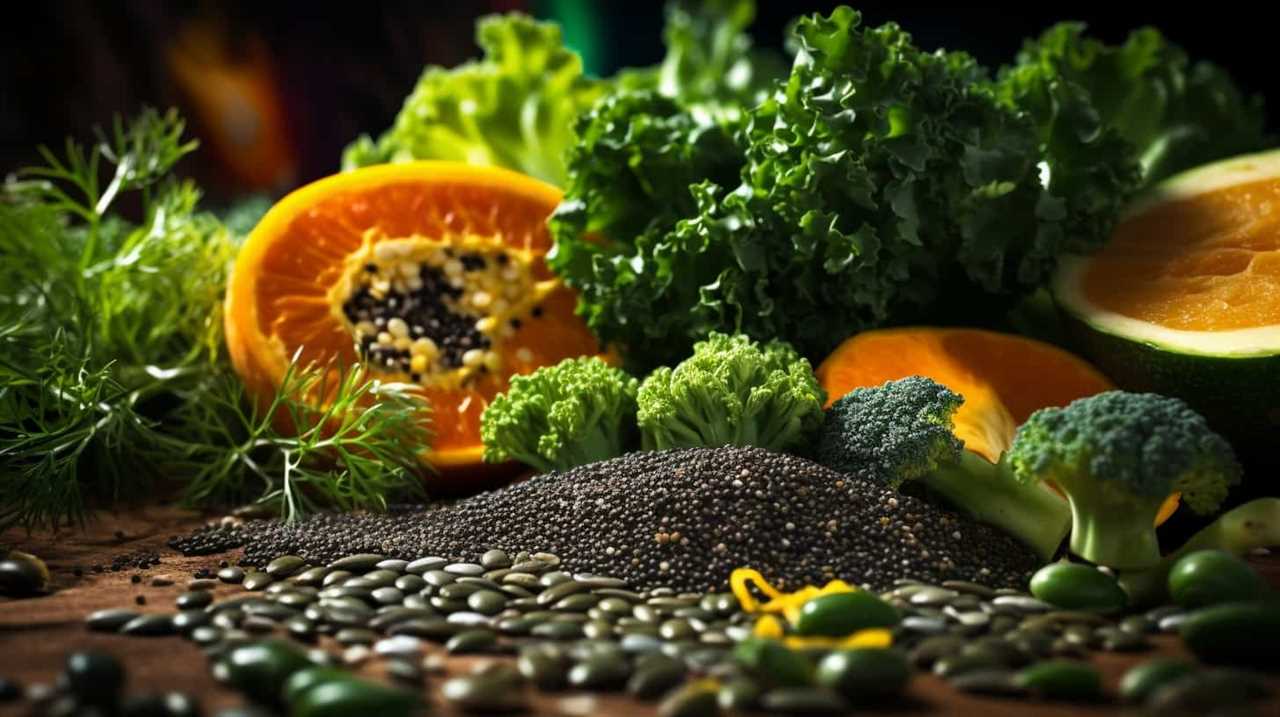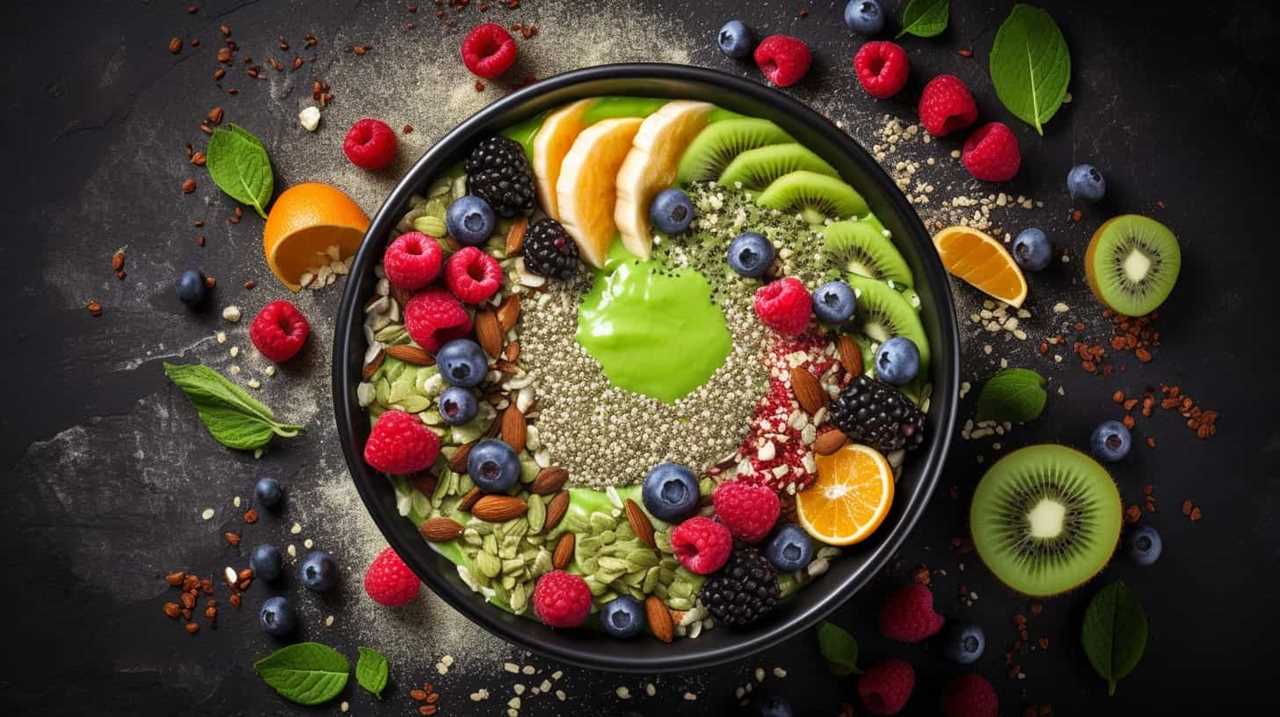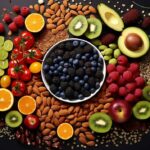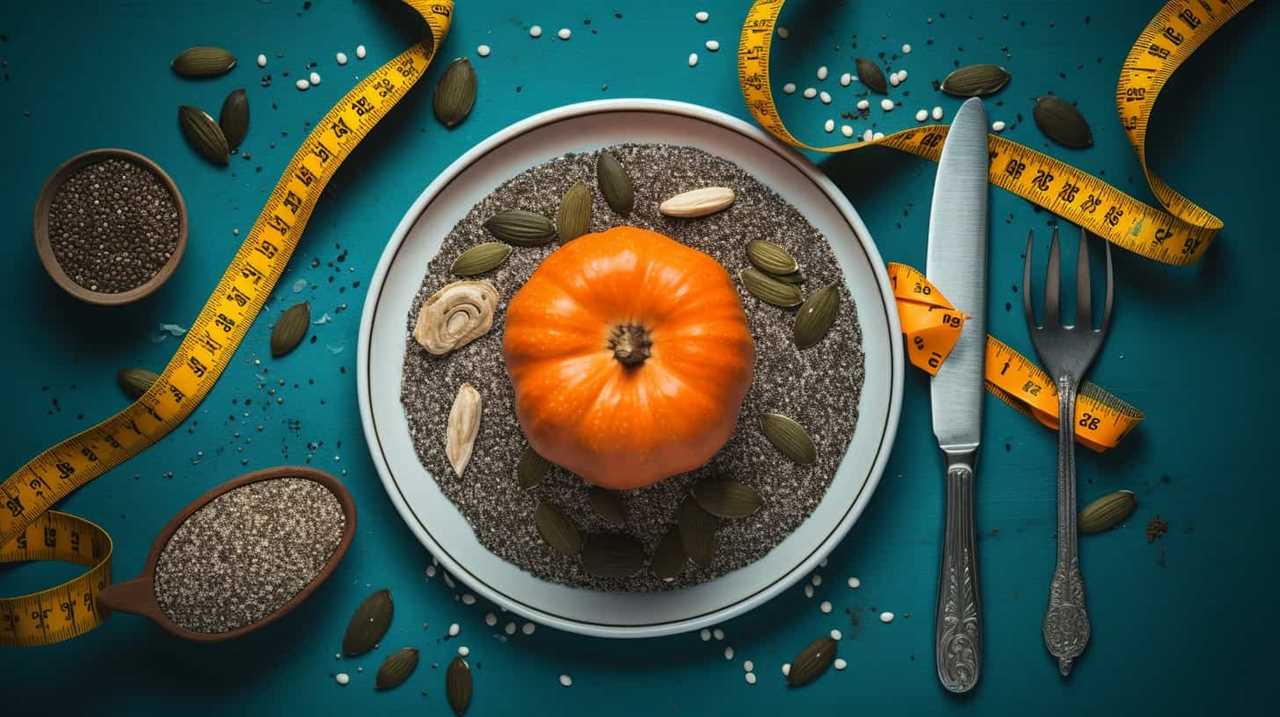Are superfoods posing a threat to our health?
In this article, we explore the potential risks and concerns associated with consuming chia seeds.
From potential allergies to digestive issues, interactions with medication, and nutrient imbalances, we delve into the evidence-based facts.
Additionally, we address safety concerns like choking hazards.

Our goal is to provide you with informative and balanced information so you can make informed choices about your health.
Let’s uncover the truth behind these superseeds and their impact on our well-being.
Key Takeaways
- Some individuals may experience allergic reactions to chia seeds, including symptoms such as hives, itching, swelling, and respiratory issues.
- Chia seed intolerance can lead to digestive discomfort such as bloating, gas, and diarrhea, especially due to their high fiber content.
- Superseeds, like flaxseeds, may interact with certain medications and health conditions, such as anticoagulant medications and diverticulitis or inflammatory bowel disease.
- Chia seeds may not provide sufficient amounts of other essential nutrients, and excessive consumption without balancing it with other omega-6 sources may upset the ideal ratio.
Potential Allergies to Chia Seeds
We have found that some individuals may experience allergic reactions to chia seeds. While chia seeds are generally considered safe for consumption, there are cases where people have reported cross reactivity concerns and chia seed sensitivity. Cross reactivity refers to the body’s immune system mistakenly identifying proteins in chia seeds as harmful, triggering an allergic response. Symptoms of chia seed allergies can vary, but commonly include hives, itching, swelling, and respiratory issues.
It’s important to note that these cases are relatively rare, and most people can consume chia seeds without any adverse effects. However, if you have a known allergy to other seeds or nuts, it’s advisable to exercise caution when introducing chia seeds into your diet.

Now, let’s move on to discuss the potential digestive issues caused by chia seeds.
Digestive Issues Caused by Chia Seeds
Some individuals may experience digestive issues from consuming chia seeds. Chia seed intolerance can lead to digestive discomfort such as bloating, gas, and diarrhea. These symptoms may occur due to the high fiber content in chia seeds, which can be difficult for some people to digest.
It’s important to note that chia seeds are generally well-tolerated by most individuals, but for those with digestive sensitivities, it may be necessary to limit or avoid chia seed consumption. If you experience digestive issues after consuming chia seeds, it’s recommended to consult with a healthcare professional to determine if chia seed intolerance is the cause.
They can provide guidance on suitable alternatives and ensure that your nutritional needs are met without causing discomfort.

Interactions With Medication and Health Conditions
Continuing our exploration into the potential risks of superseeds, let’s now delve into the interactions that these seeds may have with medications and various health conditions.
It’s important to note that while superseeds are generally considered safe and nutritious, they can interact with certain medications and health conditions, potentially causing adverse effects.
For instance, some superseeds, like flaxseeds, may have blood-thinning properties, which can interact with anticoagulant medications, increasing the risk of bleeding. Similarly, superseeds high in fiber, such as chia seeds, can interfere with the absorption of certain medications, reducing their effectiveness.
Additionally, individuals with certain health conditions, like diverticulitis or inflammatory bowel disease, may experience worsened symptoms or complications when consuming superseeds.

Therefore, it’s crucial to consult with a healthcare professional before incorporating superseeds into your diet, especially if you’re taking medications or have pre-existing health conditions.
Nutrient Imbalances and Chia Seed Consumption
While chia seeds offer numerous health benefits, it’s important to be aware of potential nutrient imbalances that may arise from their consumption. Here are four key points to consider:
-
Nutrient deficiencies: Chia seeds are rich in omega-3 fatty acids, fiber, and protein. However, they may not provide sufficient amounts of other essential nutrients like iron, calcium, and vitamin D. It’s crucial to incorporate a well-rounded diet to ensure you meet all your nutritional needs.
-
Imbalance in omega-6 to omega-3 ratio: Chia seeds contain a higher ratio of omega-3 to omega-6 fatty acids, which is generally considered beneficial. However, excessive consumption of chia seeds without balancing it with other omega-6 sources may upset the ideal ratio.

-
Phytic acid content: Chia seeds contain phytic acid, which can bind to minerals like zinc, iron, and calcium, reducing their absorption. Soaking or sprouting chia seeds can help reduce phytic acid levels and enhance mineral bioavailability.
-
Individual differences: Nutrient imbalances can vary depending on an individual’s diet, health conditions, and nutrient requirements. It’s always recommended to consult with a healthcare professional or registered dietitian for personalized advice.
While chia seeds offer nutritional benefits, it’s essential to be mindful of potential nutrient imbalances and address them through a well-balanced diet.
Choking Hazards and Safety Concerns With Chia Seeds
Transitioning from the nutrient imbalances associated with chia seed consumption, let’s now address the potential choking hazards and safety concerns posed by these superseeds.

While chia seeds offer numerous health benefits, it’s important to be aware of their potential risks. Chia seeds, when consumed dry, can absorb moisture and expand in the throat, leading to choking. To prevent choking hazards, it’s crucial to consume chia seeds soaked in liquid or incorporated into recipes.
Additionally, it’s important to drink plenty of water when consuming chia seeds to ensure they’re properly hydrated before swallowing. As with any food, safe consumption of chia seeds involves practicing moderation and being mindful of individual choking risks.
Frequently Asked Questions
Are There Any Potential Side Effects or Allergic Reactions to Consuming Chia Seeds?
When consuming chia seeds, there may be potential side effects and allergic reactions to consider. It is important to be aware of these possibilities and to consult with a healthcare professional if any concerns arise.
Can Chia Seeds Cause Digestive Issues or Gastrointestinal Discomfort?
Chia seeds can cause digestive issues or discomfort in some people. However, they are generally well-tolerated and can even promote weight loss and help control blood sugar levels. It’s important to listen to your body and adjust your intake accordingly.

Are There Any Medications or Health Conditions That May Interact Negatively With Chia Seeds?
There may be certain medications or health conditions that could interact negatively with chia seeds. It is important to consult with a healthcare professional to determine if there are any potential risks or concerns.
Can Consuming Too Many Chia Seeds Lead to Nutrient Imbalances or Deficiencies?
Consuming excessive amounts of chia seeds may lead to nutrient imbalances and potential deficiencies. It’s important to maintain a balanced diet and be mindful of portion sizes to avoid potential issues with nutrient absorption and weight gain.
Are There Any Safety Concerns or Choking Hazards Associated With Consuming Chia Seeds?
Choking hazards and potential safety concerns should be considered when consuming chia seeds. It is important to be cautious and consume them in a way that minimizes any risk to our health.
Conclusion
In conclusion, while chia seeds offer numerous health benefits, it’s important to be aware of potential risks associated with their consumption.

According to a study published in the Journal of Allergy and Clinical Immunology, approximately 2% of the population may have an allergic reaction to chia seeds.
Additionally, digestive issues and interactions with medication and health conditions should be considered.
It’s crucial to consume chia seeds in moderation and consult with a healthcare professional if any concerns arise.
















